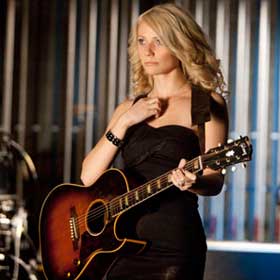Country Strong

2.5/5
Before Country Strong was even released to theaters, Gwyneth Paltrow’s calculated, savvy career restoration had already been completed. For years, she has suffered from a thoroughly un-relatable public image: from her patrician name, to her pretentious selection of roles, to her holier-than-thou online newsletter Goop, to her refusal to open up about (or even acknowledge) her rock star marriage with Chris Martin.
Country Strong—a portrait of a fictional country superstar—opened the door for her to appeal to the “average American,” and a fantastic PR plan was built around it. She started by building credibility with a knockout performance at the Country Music Awards, followed by a thoroughly enthusiastic and bombastic guest-starring role on Glee (which will undoubtedly yield an Emmy for Paltrow in 2011), and finished with a hilarious and uncharacteristically personal interview special with Chelsea Handler. The era of spiting Gwyneth is officially over. All that was left—unfortunately for Paltrow—was the movie itself. She gives a dynamic performance, but not enough to make up for the film’s shortcomings.
Director/writer Shana Feste is well aware of the genre she is entering—the “country music superstar biopic” has become so prolific in the past decade that it earned its own parody (Walk Hard). Beyond finding a way to refresh the genre, Feste has the additional challenge of chronicling a fictional superstar “Kelly Canter” rather than a real one with built-in familiarity. Feste seems pre-occupied with avoiding the tropes of the genre; the story essentially starts two-thirds of the way through the clichéd narrative. The film skips over the troubled childhood, mommy issues, discovery, first hit single, rise to stardom, and subsequent substance abuse—instead, it starts as Canter is prematurely leaving rehab as an over-the-hill country legend to embark on a comeback tour. Instead of feeling like a fresh angle, this micro-focus on Canter’s recovery causes the film to feel narrow in scope and makes it incredibly hard to understand Canter’s mental anguish and relationship with her husband (Tim McGraw).
The story serves as a depressing meta-commentary on Paltrow’s age and career. The two opening acts for Kelly Canter’s comeback tour are stealing her limelight, as two of the hottest emerging acts in country music, Beau Hutton and Chiles Stanton. Incidentally, Beau and Chiles are played by two of Hollywood’s hottest stars, who upstage Paltrow in what was supposed to be her comeback movie. Garrett Hedlund (coming off his leading role in Tron: Legacy) and Gossip Girl’s Leighton Meester bring heart and humor to the film; their romance provides the film’s strongest moments. Hedlund proved he’s capable of much more than Disney mega-franchises with his vulnerable, engaging performance.
The script reminds us again and again that Canter is “born to be on the big stage” at mega stadiums, but Paltrow’s strongest moments are her quietest: a slow, but powerful nighttime conversation drunk in a cab with Meester and a heart-wrenching (although narratively random) scene with sick child for Make a Wish. While Paltrow is reaching for Canter-levels of stardom, she proves that she’s best suited for the subtle and the understated.
The film ends with a surprising twist, proving Feste has guts as a filmmaker, but, again, preoccupied with breaking the rules of the genre, rather than staying true to character. The plot twist doesn’t surprise you, it just leaves you feeling like, after two hours with her, you still really, really don’t understand Kelly Canter—not in a mysterious way, but rather that she’s a simply incoherent character. As the credits rolled, I could overhear several audience members talking excitedly about “buying the soundtrack on iTunes” (which shot up to #1). This sounds like the appropriate reaction: the songs are great, and Paltrow can really sing, but the thought of buying the DVD won’t cross your mind.
1 Comments
Leave a comment
RELATED ARTICLES
Get the most-revealing celebrity conversations with the uInterview podcast!





the music is SO good, and the young stars so appealing that i am surprised you focus on the negative. yes, it plays on tropes, as does some country music. but garrett is very convincing as both singer and actor and leighton so believable and starry-eyed, it more than makes up for it. why not celebrate the good? why not try to get into it?!